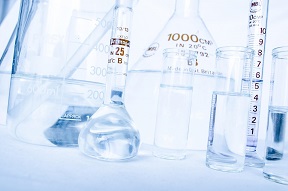A Guide to Pump Selection for Chemical Applications
A Guide to Pump Selection for Chemical Applications
Handling chemicals creates unique challenges within industries due to the wide variety of substances that may be required. These may include corrosive, abrasive, or hazardous liquids. Selecting the right pump for chemical applications is essential to ensure safety, efficiency, and reliability at every stage of the industrial process.
As a specialist pump supplier and manufacturer with over 20 years of expertise, we will consider all of the options so that we recommend the best solution, tailored to individual client needs - whatever the industry. This guide provides insights into key considerations when selecting pumps for chemical handling and highlights the features that make our pumps ideal for chemical applications.
Understanding Chemical Applications
Chemical applications are required within a range of industries, such as pharmaceuticals, petrochemicals, food production, wastewater treatment, and marine operations. These applications may require the handling of:
Acids and alkalis
Solvents
Corrosive or abrasive liquids
Flammable or explosive chemicals
Viscous or high-temperature substances
Choosing the right pump for chemical processes is of vital importance. Not only does it ensure the safe and efficient transfer of these substances, it will prevent issues such as leaks, contamination, or equipment failure which could endanger life or the surrounding environment.
Key Considerations for Pump Selection
1. Chemical Compatibility
All pump components that come into contact with the chemical must be made from materials compatible with the substance being transferred. Incorrect material selection can lead to corrosion, early degradation, or the complete failure of the pump which could be costly to replace and result in production downtime - which will affect profitability. Some pump materials you may want to consider are;
Stainless steel for general corrosion resistance
PTFE (Teflon) for handling aggressive chemicals
Polypropylene and PVDF for lightweight, non-metallic options
Specialty alloys for extreme chemical resistance
2. Seal Design
Seals are a critical component in preventing leaks and maintaining safe operation. This means that choosing the right seal type in chemical operations is essential for the effective and safe handling of aggressive substances and high pressures. Some seal options you may want to consider are:
Mechanical Seals: For handling higher pressures and reducing leakage
Magnetic Drive Pumps: Seal-less design to eliminate the risk of leaks entirely
Double Mechanical Seals: For additional protection when handling hazardous substances
3. Safety and Compliance
Safety is paramount when handling hazardous chemicals and processing compliance can differ from country to country. Our pumps are designed to meet strict international safety standards, ensuring compliance with regulations such as ATEX. ATEX-rated pumps are essential for handling flammable or explosive chemicals in environments where there is a risk that ignition could occur.
Other safety measures that can be factored into a process specification can be;
Secondary Containment: To prevent spills in case of seal failure
Leak Detection Systems: For early warning of potential issues
Explosion-Proof Motors: For added safety in hazardous areas
4. Flow Rate and Pressure Requirements
As with all liquids, different chemical processes require specific flow rates and pressures. For example, you may need a high-flow centrifugal pump or a precision dosing pump for very sensitive applications. Alternatively, you may need a variable-speed pump that offers flexibility across a number of different processes, saving you money on set up and maintenance costs.
Our process specialists have the expertise to understand your needs and offer solutions that not only deliver what you require but also future-proof and streamline your processes.
Pump Types Suitable for Chemical Applications
We supply and manufacture a variety of pumps suitable for chemical handling. As we are not tied to a particular manufacturer, we can search the whole of the market to ensure the pump we specify fully meets the needs of your application. Pump types typically suited to chemical processes are:
Centrifugal Pumps: Ideal for high-flow, low-viscosity liquids
Diaphragm Pumps: Suitable for handling abrasive or viscous chemicals
Peristaltic Pumps: For gentle handling of shear-sensitive liquids
Magnetic Drive Pumps: Leak-free operation for hazardous substances
Progressing Cavity: For high Pressure and high viscosity handling
Gear Pumps: For precise metering and transfer of viscous liquids
Specialised Solutions for Marine Chemical Handling
Marine-grade pumps are designed to withstand harsh conditions while maintaining performance and reliability. Chemical handling in marine environments presents additional challenges, such as exposure to saltwater and variable temperatures which need to be taken into account when selecting the correct pump for your process.
Key features of marine chemical pumps include:
Corrosion-resistant materials
Compact and portable designs
Compliance with marine safety standards
Why Choose North Ridge for Your Chemical Pump Needs?
With over two decades of experience in pump supply and manufacturing across many different industries, we have the expertise to provide tailored solutions for even the most complex chemical applications. Here is why clients trust us;
Whole of Market Access: We search the entire market to find the best pump for your unique needs.
Expert Guidance: Our team of specialists provides technical support from selection through to installation and maintenance.
Custom Solutions: We can design and manufacture bespoke pumps for specific applications.
Compliance and Safety: We ensure all pumps meet the necessary regulatory standards for your industry.
Contact Us
Whether you're handling acids, solvents, or flammable liquids, we have the expertise to provide a safe, efficient, and reliable pump solution. Contact us today to discuss your chemical application needs and let our experts guide you to the perfect pump for your process.
Pumps for Chemical Applications available from North Ridge Pumps





